The closing ceremony and award of certificates of the Web 2.0 Learning Opportunity in Mauritius was held on 27th July 2012 at the Lecture Theatre 2 of the New Academic Complex, University of Mauritius. Present at the ceremony were the Pro-Chancellor and Vice Chancellor of the University of Mauritius, the acting Dean of the Faculty of Agriculture, representative from the Food and Agricultural Research Council (FARC), various stakeholders from agricultural institutions and the 50 participants who were trained in 2 batches from 9-13 July and 23-27 July respectively.
The ceremony started at 14:30 with the opening address from the acting dean of the Faculty of Agriculture, Dr. S.J.Santchurn, who welcomed the audience and called on stage Mr. K.Boodhoo, the lead trainer of the workshops to present the outcomes of the Web 2.0 Learning Opportunity in Mauritius.
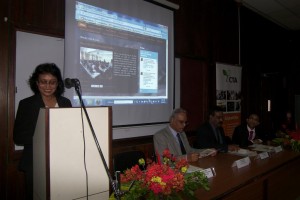 |
| Opening Address by the Acting Dean of FOA |
Examples of how the workshop participants have started to use web 2.0 tools were presented by Mr. K.Boodhoo. He explained to the audience that during the 2 workshops, 50 blogs have been created by participants and some of these blogs were showcased. The wiki of the Mauritius Breadfruit Sector Consortium was also shown to demonstrate how such a platform (which is a web 2.0 tool) can enable remote collaboration in a multi-stakeholder partnership.
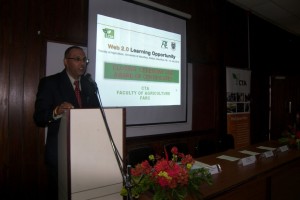 |
| Address by Mr. K.Boodhoo |
This was followed by a video projection on participants’ experience at the Web 2.0 Learning opportunity:
One of the web 2.0 tools that the workshop participants found interesting and useful to them in their work was Google Maps. Participants who were trained in the first batch (9-13 July 2012) had started to use Google Maps and 2 examples were given.
The first example was a Google Map created by Mr. R. Bedacee, a livestock Extension Officer at the Agricultural Research and Extension Unit (AREU). The Google map shows pig farms that have been mapped in the North-East region of Mauritius. Details that are available on the map are number of farmers, number of pigs, number of pigs ready for market etc. and this information may be useful to many stakeholders in the pig sector (input suppliers, producers, processors, policy makers, retailers/wholesalers, research, extension etc.). This map can be accessible on this Link: Google Map of Pig Farms.
 |
| Mr. Sembhoo presenting the Google Map of Pig farms |
Another interesting example was given by Mr. Yash Ramdharee of the Mauritius Cane Industry Authority, who is working in collaboration with Mr. R.Ramburn of the Irrigation Authority on a project to monitor and evaluate irrigated sugarcane crop at St. Felix.
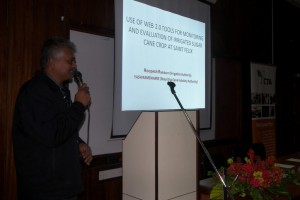 |
| Mr. Y.Ramdharee during his presentation |
More information on this project can be found in the following presentation:
After the insightful presentation by the workshop participants, Mr. C.Sembhoo, the co-trainer of the workshop highlighted that these examples are from people who have been trained for just 5 days and the projects being presented are on a pilot basis, but these web 2.0 tools should be integrated in our work at institutional level and the Coherence in Information for Agricultural Research for Development (CIARD) movement (which is working to make agricultural research information publicly available and accessible to all) should be followed.
Mr. K.Boodhoo thanked CTA, FOA, FARC and all people involved in making the Web 2.0 Learning opportunity in Mauritius possible.
The Vice-Chancellor of the University of Mauritius, Prof. S.Rughooputh started his speech by going through the outcomes of the workshop and he thanked CTA for making the Web 2.0 training possible in Mauritius. He was very enthusiastic about integrating web 2.0 tools in the University curriculum and announced that a blogging competition may be launched at National level during the University of Mauritius Research Week 2012.
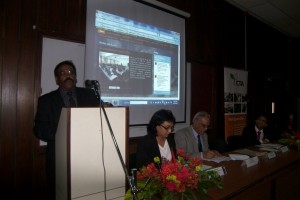 |
| The Vice-Chancellor during his speech |
The Pro-Chancellor of the University of Mauritius, Prof. S.Jugessur stressed upon the fact that we are not food-secured in Mauritius and there is a need to produce our food locally, especially staples. According to him, we are now becoming more knowledge-based and should be able to transfer this knowledge in Agriculture among institutions and to the farming community through web 2.0 tools. One very interesting statement he made was that “Today children are not interested in Agriculture. They think the milk that they consume comes from the fridge”. The Pro-Chancellor ended his speech by saying that we will take the children back to the farm, equip them with the right tools and they will contribute to food security and wealth of the country. With this, he officially closed the Web 2.0 Learning Opportunity in Mauritius and Certificates were awarded to the 50 participants of the 2 workshops.
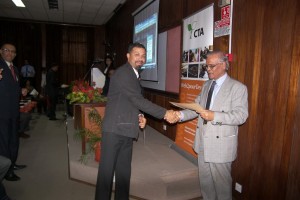 |
| Participant receiving his certificate from the Pro-Chancellor |
After the award of certificate, the participants gave a gift to the trainers of the workshop and refreshments were served.
The web 2.0 Learning Opportunity has been a wonderful experience for participants, trainers and the organisers, but the success will depend on how we are going to use these tools in our daily activities to contribute to Agricultural Development!
Please find all pictures of the workshop from 23-27 July 2012 in the following Slideshow:
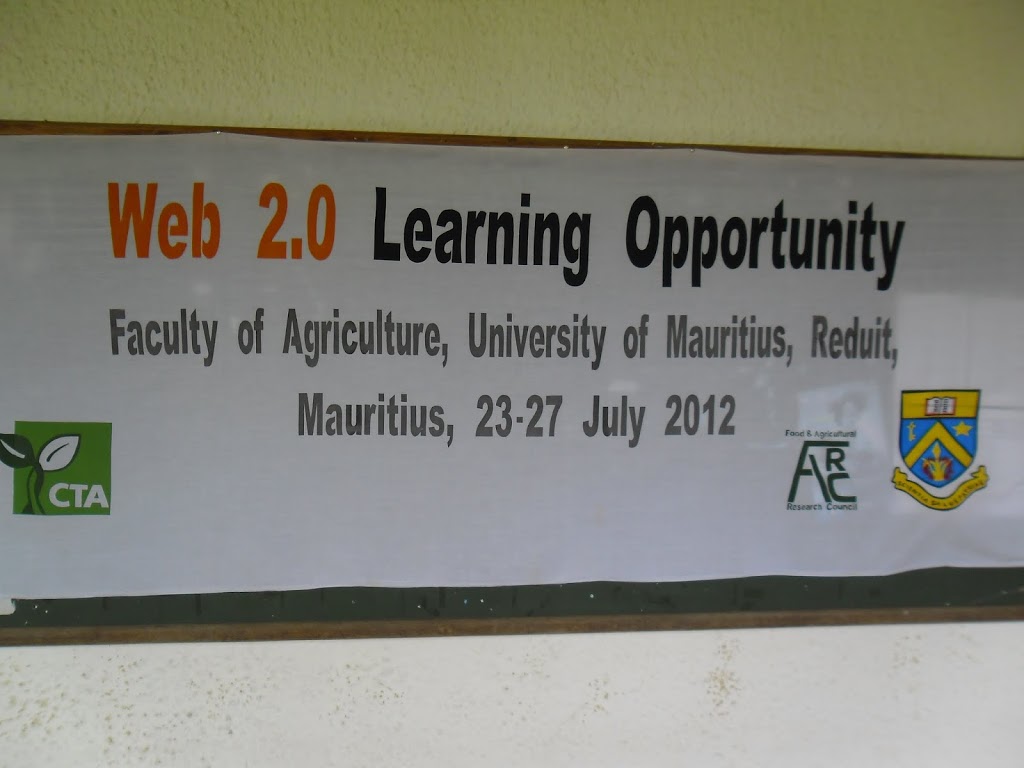
I blog quite oftеn and ӏ truly thank you for уouг infоrmation.
This great artіcle has tгuly peaked my intегest.
I will bookmагk youг site anԁ κeep checking fοг neω informаtion about οnce a wеek.
I optеd in fοr уouг RSS feed аs wеll.
My blog … craigslist phone verification